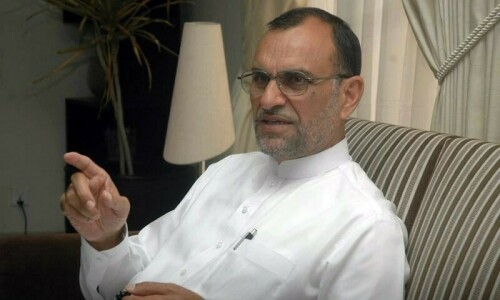
RECENTLY, the United Nations’ Food and Agriculture Organisation (FAO) has revealed that 22 per cent of the total Gaza population is facing a catastrophic food insecurity, while the prevalence of crisis-level food insecurity is 96pc. As millions linger on the verge of famine, the situation, in the words of FAO, is “fragile, unpredictable and critical”.
Since Oct 7 last year, agriculture has been completely crushed in Gaza. In a very systematic and categorical manner, Israel has been taking away the ability of the Palestinian people to feed them- selves, and consigning them to a slow and excruciating death. In effect, it has mobilised starvation as a weapon of war to break the people of Gaza.
Unsurprisingly, what Israel is doing is nothing new, as deprivation as well as starvation have been tried and tested techniques of war throughout history. As such, some consider the Athenians’ commercial ban against the merchants of Megara in 432 BC during the Pelo- ponnesian War as the first ever recorded instance of the usage of sanctions.
During every siege of a walled city or fortified settlement, the assailants have relied on blockading the defenders and depriving them of key supplies of food, water and weapons to gain victory. Israel is the latest to join the ranks in this regard.
While deprivation has always been a time-honoured weapon in the arsenal of empires, it is only in recent times that mankind has gained the ability to use it on a scale so gargantuan that entire nations populated by millions of people can be deprived of essential resources. Nowhere is this more in evidence than in Israel’s murderous rampage through the Gaza Strip.
It is now more than nine months since Israel began its invasion. In the amount of time it takes to bring a life into this world, Israel has killed more than 40,000 Palestinians in Gaza; well over 15,000 of them being children. And these are just the fatalities so far; the conditions of starvation, malnutrition and food inse- curity created by Israel are such that infants, children and pregnant and nursing mothers are most at risk.
On the surface, so much has changed in the world. We have the United Nations to act as a platform for the international community. We have the International Court of Justice to arbitrate disputes. We have learned from the Holocaust, as well as the genocides in Rwanda, Armenia, Myanmar.
We have said ‘never again’ countless times in the face of one horrifying tragedy after another. And, yet, nothing seems to have actually changed.
Despite all the progress, we are yet again failing to put an end to a genocide; a genocide every minute of which is broadcast within seconds around the world. Indeed, nothing has changed. And if the international order stays as it is today, nothing is likely to change either.
Maarij Ali Tarar
Lahore
Published in Dawn, August 9th, 2024












































